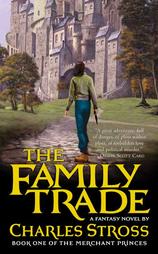Science fiction writer Charlie Stross explains why he hates Star Trek
At his recent keynote speech at the New York Television Festival, former Star Trek writer and creator of the re-imagined Battlestar Galactica Ron Moore revealed the secret formula to writing for Trek.
He described how the writers would just insert “tech” into the scripts whenever they needed to resolve a story or plot line, then they’d have consultants fill in the appropriate words (aka technobabble) later.
“It became the solution to so many plot lines and so many stories,” Moore said. “It was so mechanical that we had science consultants who would just come up with the words for us and we’d just write ‘tech’ in the script. You know, Picard would say ‘Commander La Forge, tech the tech to the warp drive.’ I’m serious. If you look at those scripts, you’ll see that.”
Moore then went on to describe how a typical script might read before the science consultants did their thing:
La Forge: “Captain, the tech is overteching.”
Picard: “Well, route the auxiliary tech to the tech, Mr. La Forge.”
La Forge: “No, Captain. Captain, I’ve tried to tech the tech, and it won’t work.”
Picard: “Well, then we’re doomed.”
“And then Data pops up and says, ‘Captain, there is a theory that if you tech the other tech … ‘” Moore said. “It’s a rhythm and it’s a structure, and the words are meaningless. It’s not about anything except just sort of going through this dance of how they tech their way out of it.”
Stross compares it with the way he goes about creating written SF.
I start by trying to draw a cognitive map of a culture, and then establish a handful of characters who are products of (and producers of) that culture. The culture in question differs from our own: there will be knowledge or techniques or tools that we don’t have, and these have social effects and the social effects have second order effects — much as integrated circuits are useful and allow the mobile phone industry to exist and to add cheap camera chips to phones: and cheap camera chips in phones lead to happy slapping or sexting and other forms of behaviour that, thirty years ago, would have sounded science fictional. And then I have to work with characters who arise naturally from this culture and take this stuff for granted, and try and think myself inside their heads. Then I start looking for a source of conflict, and work out what cognitive or technological tools my protagonists will likely turn to to deal with it.
Star Trek and its ilk are approaching the dramatic stage from the opposite direction: the situation is irrelevant, it’s background for a story which is all about the interpersonal relationships among the cast. You could strip out the 25th century tech in Star Trek and replace it with 18th century tech — make the Enterprise a man o’war (with a particularly eccentric crew) at large upon the seven seas during the age of sail — without changing the scripts significantly. (The only casualty would be the eyeball candy — big gunpowder explosions be damned, modern audiences want squids in space, with added lasers!)
That’s right on the money for me. But I read an awful lot of written SF, and I’m not a big fan of franchise TV science fiction at all.
The way Charlie Stross writes science fiction produces the sort of science fiction I like to read. The “tech the tech” approach all too often results in the sort of contrived dea-ex-machina endings which will be very familiar to viewers of Russell T Davies’ writing in Dr Who and Torchwood. Look at the ending of “Children of Earth”, for example. Very powerful human drama, yes. Coherent science-fiction, no way.
I remember a quote from a few years back that SF Cinema was a generation behind written SF, and TV was a generation behind that. I also get the impression that most franchise science fiction TV is written by people with no understanding or interest in science, so it’s not surprising we all-too often end up with something that resembles a soap opera with a few SF props as window-dressing.
Fine if you like that sort of thing, but it’s a pity that ‘real SF’ never makes it to the small screen. In order to justify the special effects budgets, they have to hook in an audience far broader than SF fans, and that audience tends to want soap opera.
I’ve even run into that attitude from within the SF world. I remember the sysop of the Compuserve SFLIT forum years ago patronisingly repeating the mantra “If you care about the characters, nothing else matters; if you don’t care about the characters, nothing else matters” when I took exception to her dismissing Frank Herbert’s classic “Dune” in favour of the latest Big Fat Fantasy epic which read too much like an American daytime soap opera for me to stomach.
 I’ve got mixed feelings about the
I’ve got mixed feelings about the 


